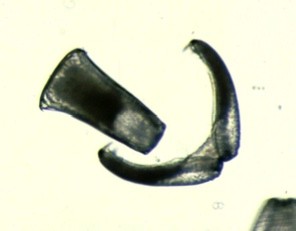Potamilus alatus was the Mussel of the Month back in February 2006. Since then, recent phylogenetic analyses (Smith et al., 2019, 2020) have revised the constituents of Potamilus, and we thought that would be a good reason to take up the genus again.
 Historically, Potamilus* was unambiguously diagnosed by the presence of ax-head-shaped glochidia (Baker, 1928). However, from the earliest molecular phylogenetic studies, Leptodea (which has tiny, non-ax-head-shaped glochidia) has been recovered nested within a paraphyletic Potamilus (Roe & Lydeard, 1998). Subsequent analyses that recovered Potamilus as monophyletic (e.g., Zanatta & Murphy, 2006) didn’t include P. capax — this month’s mussel. P. capax is apparently the KerPlunk-stick on which the taxonomy of Potamilus and Leptodea rested. Historically, Potamilus* was unambiguously diagnosed by the presence of ax-head-shaped glochidia (Baker, 1928). However, from the earliest molecular phylogenetic studies, Leptodea (which has tiny, non-ax-head-shaped glochidia) has been recovered nested within a paraphyletic Potamilus (Roe & Lydeard, 1998). Subsequent analyses that recovered Potamilus as monophyletic (e.g., Zanatta & Murphy, 2006) didn’t include P. capax — this month’s mussel. P. capax is apparently the KerPlunk-stick on which the taxonomy of Potamilus and Leptodea rested.
Today, Leptodea is considered a junior synonym of Potamilus — until someone makes up a new genus name to more splittingly account for the phylogenetic diversity of Potamilus (+ Leptodea).
--
* As a fun side-note, Potamilus Rafinesque, 1818 was referred to as Proptera Rafinesque, 1819 for most of the 20th century.† In 1818, Rafinesque used the name Potamilus as the genus for all the North American mussels he knew about at the time. All 25 of the species that he then listed in Potamilus were undescribed at the time (and therefore unavailable), but they were eventually described by him in 1820. All of them except two — Potamilus alatus and P. phaiedrus. By 1819, Rafinesque caught up with the rest of the world and abandoned Potamilus for Unio, but he split Unio in North America into several subgenera, including Proptera. All of the species that he included in Proptera were still unavailable at the time, including P. alatus and P. phaiedrus.
So why do we even use the genus Potamilus or Proptera? Because for some reason we have all conceded that Rafinesque’s uses of the name “alatus” in 1818 and 1819 refer to Unio alatus Say, 1817. That name was available at the time. It is suspicious that “alatus” was the only name applied by Rafinesque that referred to one of Say’s species. Rafinesque didn’t mention any of the other 9 species that were also described by Say in the same work as Unio alatus. But, that is where we are at.
† This is a duel for priority of Rafinesque names, so you can expect that it will be bananas. |